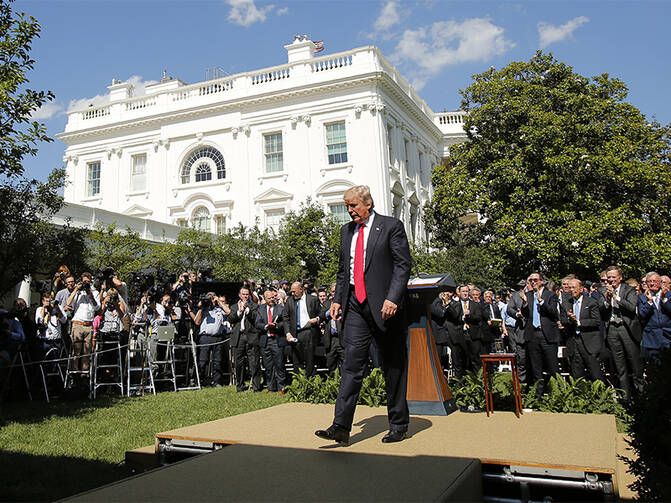President Trump’s decision to pull out of the landmark Paris agreement sparked a global outcry and provided yet another flashpoint to illuminate the nation’s stark political divide on climate change: The U.S. right largely rallied to his side while those on the left gnashed their teeth over what seemed like a planet-threatening move.
But the controversial move earlier this month was also another indicator of the sharp contrast between conservative Christians and the rest of the American religious scene, as predominantly white evangelical Protestants often hailed the president’s action while Catholics, mainline Protestants and leaders of other faiths decried it.
“Climate change is real. Failing to protect the earth is not just a failure of leadership. It is a moral failure,” Chicago Cardinal Blase Cupich wrote in a tweetstorm of criticism that was echoed by Catholic officials from Washington to the Vatican, where Pope Francis has made environmental protection a priority.
On the other side, however, conservative Christians such as the popular commentator—and theology student—Erick Erickson were having none of it.
“I worship Jesus, not Mother Earth,” Erickson tweeted. “He calls us all to be good stewards of the planet, but doesn’t mean I have to care about global warming.”
Speaking at a town hall meeting in Coldwater, Mich., GOP Rep. Tim Walberg – a graduate of evangelical schools – made a similar point: “As a Christian, I believe that there is a creator in God who is much bigger than us. And I’m confident that, if there’s a real problem, he can take care of it.”
Yet the question of just why white evangelicals are such outliers on this issue remains a matter of intense debate.
The simplest, and most common, explanation is that conservative Christians are simply putting their political preferences first, like most people do; indeed, surveys show that white evangelicals remain stalwart Trump supporters and backers of GOP economic and other policies, and that pattern seems to hold on this issue as well.
The question of just why white evangelicals are such outliers on this issue remains a matter of intense debate.
“Reports @realDonaldTrump withdrawing from Paris Accord are good news,” tweeted Ralph Reed, a veteran of the religious right and chairman of the Faith and Freedom Coalition. “Hurts US economy, kills jobs, goes easy on China & India. Bad deal.”
But several other factors complicate the straightforward, politics-based answer.
For example, new research indicates that on environmental issues, at least, conservative Christian theology may be the driving force behind the sharply divergent views of evangelicals.
That’s the upshot of a new study by Nebraska sociologist Philip Schwadel and Washington State University sociologist Erik Johnson, published in the April edition of the Journal for the Scientific Study of Religion. The study uses almost three decades of repeated cross-sectional data to show that the opinions of conservative evangelicals on environmental policies are informed by theology more than ideology.
New research indicates that on environmental issues, at least, conservative Christian theology may be the driving force behind the sharply divergent views of evangelicals.
“Even in the 21st century, when politics seem to be of utmost importance, differences in support for environmental spending among different religious groups have nothing to do with political perspectives,” Schwadel said. “Theological views seem to be the biggest factor explaining differences between evangelicals and other Americans.”
In an interview with RNS, Schwadel explained that on environmental concerns, party affiliation played as large a role in influencing the views of Americans overall as did their religious beliefs, and both those factors outstripped every other variable, such as education, sex, income, race and geography.
But when comparing evangelicals to some other religious groups, the evidence indicated that religious views were far more important for evangelicals than for other Christians.
The chief theological marker of their beliefs, he said, is that evangelicals tend to have a literal view of the Bible—they believe that in Genesis the “earth was given to them to do as humans will” and that the prophecy at the end of the New Testament that Jesus will return in glory to rapture his followers is soon to be fulfilled.









Evangelicals seem to base their scientific views in the Bible. The Bible is not a science book. It is a religious book. Science is based on what is observable. Observable evidence does not support the idea that the earth was created in seven days a few thousand years ago. I find it hard to believe that anyone can attempt to make the Bible into a science book.
People can believe whatever they want about God, but my observation is that God will allow humans to suffer for stupidity. Evangelicals seem not to care that people will suffer because of climate change, people will die because of it, and wars will be fought over resources that are declining because of climate change. Jesus cared when he saw suffering people. Jesus healed the sick and fed the hungry. "Let them suffer and die" is not a Christian belief.